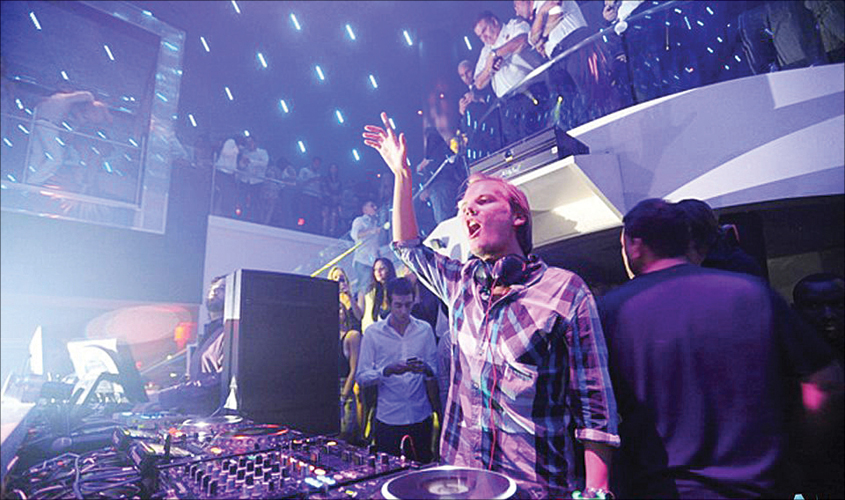The music world has been in shock and grief since the death of Swedish DJ Avicii was announced on 20 April.
Hailing from the Swedish capital Stockholm, the globally acclaimed DJ and producer was found dead in Muscat, Oman. Following the incident, his family’s open letter revealed, he “could not go on any longer” and “wanted to find peace”. He was 28.
News reports say that the DJ, whose real name was Tim Bergling, succumbed to “self-inflicted injuries”.
And what led to this tragedy? It could have been the effect of worldwide fame, the stress of being in the music business. Never shirking from speaking about personal issues, Bergling openly talked about the stress and anxiety caused by his chosen career. This was evident in his interviews, statements and his shocking decision, announced in 2016, to “retire” from doing live acts.
Bergling’s journey on the road to becoming a global musician commenced during his teenage years. It was then that he started DJ-ing and released his first single, in 2007. In the years after that, he released a bevy of singles and remixes that established his name as a leading EDM musician.
His breakout hit in 2010 was “Seek Bromance”, which paved the way for his next one, “Levels” that later fetched him a Grammy nomination besides topping the charts in several European countries.
Already a worldwide success and part of the mainstream music industry by the age of 21, the DJ collaborated with renowned artiste David Guetta in “Sunshine” in 2012, which got him another Grammy nomination. In the fall of the same year, his popularity skyrocketed as he became the first DJ to headline New York’s esteemed Radio City Music Hall. Since then he had been frequently headlining various music festivals and performing at prestigious events.
His debut album, True (2013), featured “Wake Me Up”, which peaked the charts in multiple countries and maintained itself at numero uno on Billboard’s Dance/Electronic Songs chart for fourteen weeks. Credited for ushering in an era of electronic music, Bergling worked with many musicians, like Robbie Williams, Rita Ora, Green Day among others in his career.
At a young age, he had garnered praises from music critics, fellow artistes and fans across the world. Therefore, when he announced his decision to quit touring in 2016, it spurred a significant amount of negative reactions. The reasons stated for the retirement was that live performances and excessive touring worsened his alcoholism and caused him physical and mental problems.
A few months after making this announcement, Bergling posted a message regarding the same and the continuation of his studio work on his official website. It read, “Last year I quit performing live. Many of you thought that was it. But the end of live never meant the end of Avicii or my music. Instead, I went back to the place where it all made sense—the studio. The next stage will be all about my love of making music to you guys. It is the beginning of something new. Hope you’ll enjoy it as much as I do.”
In the years preceding his retirement from live shows, he had suffered from acute pancreatitis and following two surgeries, he had taken a break from a series of shows to recover. Overwhelmed with all this, he repeatedly mentioned his mental conflicts with anxiety and stress, and deteriorating health. The toll it took on him is backed by the staggering number of shows—813—that he performed in only eight years.
On numerous occasions, he talked about the pain and exhaustion the jetsetting lifestyle of a popstar was causing him. This was well depicted in a Netflix documentary that was also released in cinemas last year. Titled Avicii: True Stories, the film, though no longer available on the streaming platform, provides crucial insights into what made him hit the breaking point.
The film chronicles his battles with the music industry. To quote Bergling from the documentary, “I have told them [his managers] this: I won’t be able to play anymore. I have said, like, I’m going to die. I have said it so many times. And so, I don’t want to hear that I should entertain the thought of doing another gig.”
Unfortunately, being in the music business pushed him to a point where he couldn’t take it anymore.
The heartbreaking news of the demise of the talented artist flooded news and social media platforms on 20 April. Tributes poured in from the music industry and Avicii’s wide fan base.
A day after his death, thousands of his fans gathered at his birthplace, in Stockholm, to mourn him. They remembered him by crooning to his popular songs. His friends from the music industry are giving him tributes in their live shows by performing his songs.
In this difficult time, his family’s statement seeks to provide closure to them: “Our beloved Tim was a seeker, a fragile artistic soul searching for answers to existential questions. An over-achieving perfectionist who travelled and worked hard at a pace that led to extreme stress. When he stopped touring, he wanted to find a balance in life, to be happy and be able to do what he loved most: music.”
The statement further delved into his struggle, “Tim was not made for the business machine he found himself in; he was a sensitive guy who loved his fans but shunned the spotlight.”
Avicii brought a fierce electronic music revolution that had the world going crazy over the genre. But somewhere along the road, the self-confessed introvert’s bout with success, the relentless intrusion in his personal life by media, and his superstar lifestyle ultimately cost him his life. As the open letter by his family puts it, “Tim, you will forever be loved and sadly missed. The person you were and your music will keep your memory alive.”

